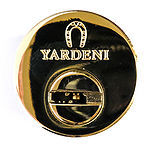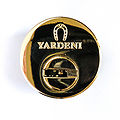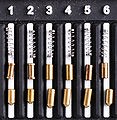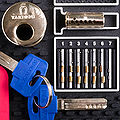Yardeni 6: Difference between revisions
(Major content additions) |
|||
| Line 34: | Line 34: | ||
# Remove the rear plate. | # Remove the rear plate. | ||
# Insert the key and turn the [[plug]] 30-45 degrees. | # Insert the key and turn the [[plug]] 30-45 degrees. | ||
# Withdraw the plug from the cylinder. (A [[plug follower]] and [[core shims]] are strongly recommended) | # Withdraw the plug from the cylinder. (A [[plug follower]] and [[Plug_follower#Core_shim |core shims]] are strongly recommended) | ||
'''Euro cylinder''' | '''Euro cylinder''' | ||
Revision as of 18:16, 17 January 2023
Yardeni 6
| Yardeni 6 | |
 | |
| Name | Yardeni 6 |
|---|---|
| Manufacturer | Yardeni |
| Lock Type | Cylinder |
| Lock Design | Pin-tumbler, Dimple |
| Specifications | |
| # of Components | 6 |
| Component Type | Pin-tumbler |
The Yardeni 6 is a dimple lock made by the Israeli company Yardeni.
Principles of operation
The Yardeni 6 a pin-tumbler lock operated by a dimple key. The key is bitted on both sides of the blade and is reversible.
The lock contains six pin stacks of traditional brass pins. Key pins are standard and driver pins include two spool security pins. To open the lock, all six key pins must be aligned at the shear line. (See also Pin-tumbler, Principles of operation) The core of the lock is also drilled to house two steel pins for drill protection.
Model variations
The Yardeni 6 is available in the following cylinder form factors: RIMO cylinder, euro profile, padlock, and cam lock.
Disassembly instructions
The Yardeni 6 is disassembled in the same way as a traditional pin-tumbler cylinder. Steps vary slightly across different cylinder form-factors.
Rim/mortise cylinder
- Remove the rear plate.
- Insert the key and turn the plug 30-45 degrees.
- Withdraw the plug from the cylinder. (A plug follower and core shims are strongly recommended)
Euro cylinder
- The use of a pinning shoe is the preferred method for disassembling a double euro cylinder. Another method is to use a segmented follower. The c-clips retaining both cores must first be removed and then both cores can be pulled out slightly in order to remove the center cam. One core should be rotated 30-45 degrees either clockwise or counter-clockwise -- once the cam is removed. This allows the core to be removed without driver pins entering gaps for the cam clutch. At that point, a segmented follower can be used to remove the core.
- Locks not intended for installation and use can be disassembled in a quick but destructive procedure. The cylinder housing itself can be cut in the middle using a hacksaw or grinder. The cam will no longer be held in place and can be removed. The resulting two cut half euro cylinders can then be disassembled as outlined above.
Gallery
See also
| This article is a stub. You can help Lockwiki by expanding it. |





